The Huntsville/Madison County Chamber is pleased to present the 2018 Redstone Update. Here are bios for the panelists and speakers, for our event on November 29.
Note: Registration is CLOSED.
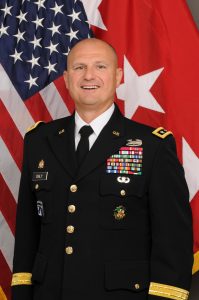
LTG Edward Daly
Lieutenant General Edward M. Daly
Deputy Commanding General, U.S. Army Materiel Command
Senior Commander for Redstone Arsenal
Lieutenant General Edward M. Daly assumed duties as the Deputy Commanding General of the U.S. Army Materiel Command on 7 August 2017. In his role, he is responsible for managing the day-to-day operations of the Army’s logistics enterprise. He also serves as the Senior Commander of Redstone Arsenal, Alabama.
He previously served as the Commanding General of Army Sustainment Command at Rock Island Arsenal, Illinois, where he executed Army Materiel Command’s mission to deliver readiness. Prior to commanding ASC, he served as Army Materiel Command’s Deputy Chief of Staff, overseeing the roles and functions of the Headquarters staff.
Lieutenant General Daly was 37th Chief of Ordnance and Commandant of the U.S. Army Ordnance School. He also served as Executive Officer to the Deputy Chief of Staff, Army G-4; Commander of the 43rd Sustainment Brigade, 4th Infantry Division (Mechanized) at Fort Carson, Colorado, and deployed in support of Operation ENDURING FREEDOM, Afghanistan; Deputy
Assistant Chief of Staff/Chief Plans Officer, G-4, North Atlantic Treaty Organization Rapid Deployable Corps based in Italy and deployed in support of Operations ENDURING FREEDOM and IRAQI FREEDOM; and Commander of 702nd Main Support Battalion, Division Support Command, 2nd Infantry Division, Eighth Army, Republic of Korea.
Earlier assignments as a company grade officer include various logistics and leadership roles with 1st Cavalry Division at Fort Hood, Texas; United States Army Europe; and Fort Bragg, North Carolina, where he deployed in support of Operation DESERT SHIELD/DESERT STORM. He also served as Assistant Professor of Military Science at Gonzaga University in Spokane, Washington.
Lieutenant General Daly was commissioned as a second lieutenant in the Ordnance Corps upon his graduation from the United States Military Academy at West Point in 1987. He earned Master’s Degrees in Business Administration from Gonzaga University, and in Strategic Studies from the U.S. Army War College.
His awards and decorations include the Distinguished Service Medal, Legion of Merit, Bronze Star Medal, Defense Meritorious Service Medal, Meritorious Service Medal, Joint Service Commendation Medal, Army Commendation Medal, Army Achievement Medal, Combat Action Badge, and Parachutist Badge.
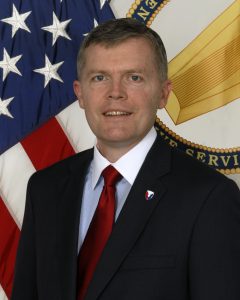
John Nerger
John B. Nerger
Senior Military Advisor, Huntsville/Madison County Chamber
Director, Analytical Mechanics Associates
Mr. Nerger retired from the Department of the Army in 2015 after nearly 36 years of federal government service, including 15 years as a member of the Senior Executive Service, concluding his career as the Executive Deputy to the Commanding General, U.S. Army Materiel Command. He currently serves as the Senior Military Advisor for the Huntsville/Madison County Alabama Chamber of Commerce and also supports the Tennessee Valley BRAC Committee and Redstone Regional Alliance. He consults part-time for the Army and is a senior technical advisor and Director for Analytical Mechanics Associates, an aerospace engineering company. He is the vice-chair of the Alabama Space Science Exhibit Commission overseeing the U.S. Space & Rocket Center and serves on the Board of Directors for the Association of Defense Communities.
Mr. Nerger holds degrees from Northwestern University and the University of Virginia, and he attended the U.S. Army War College. His awards include Presidential Rank Awards of Distinguished Executive and Meritorious Executive.
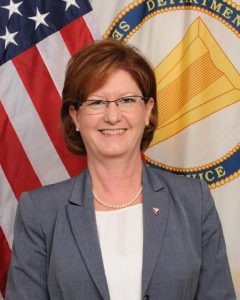
Lisha Adams
Lisha Adams
Executive Deputy to the Commanding General, Army Materiel Command
Lisha Adams assumed duties as the Executive Deputy to the Commanding General (EDCG) effective August 9, 2015. As EDCG, Ms. Adams is responsible for materiel life cycle management, acquisition support, personnel and resource management, industrial base operations, enterprise integration, research and development, and science and technology for a globally reaching command with over 63,000 personnel with an impact or presence in 144 locations globally and all 50 states. She previously served as the Deputy Assistant Secretary of Defense for Materiel Readiness, the principal advisor to the Office of the Secretary of Defense leadership on policies, procedures, and actions related to the materiel readiness of Department of Defense weapons and other materiel systems.
Ms. Adams has over 30 years of experience in government service supporting Army and Joint Service programs. A graduate of the Army Materiel Command Materiel Maintenance Management Intern Program, she has held various leadership positions in acquisition and sustainment, including Logistics Division Chief, Unmanned Vehicle Systems Project Office; Director of Logistics, PEO for Tactical Missiles; and Principal Deputy, G-3, U.S. Army Aviation and Missile Command. Selected for the Senior Executive Service in January 2011, Ms. Adams served as the Executive Director, Integrated Materiel Management Center, U.S. Army Aviation and Missile Command. In June 2011, Ms. Adams was assigned as the Assistant Deputy Chief of Staff, G-3/4 for Logistics Integration, responsible for sustaining the Joint Warfighter, through command and control of supply chain management, depot and National Maintenance Program operations, asset management and distribution, reset, and ammunition/chemical stockpile management.
Ms. Adams earned her Bachelor of Arts degree in economics from Birmingham-Southern College and received her Master of Business Administration degree from the Florida Institute of Technology. Ms. Adams is Defense Acquisition Level III certified in Program Management and Lifecycle Logistics.
Ms. Adams’ awards include the Department of the Army Decoration for Exceptional Civilian Service; DA Meritorious Civilian Service Award; DA Superior Civilian Service Award; DA Civilian of the Year; Redstone Chapter AUSA, 2010; DA Integrated Logistics Support Achievement of the Year Award for ILS Management; and the Commander’s Award for Civilian Service.
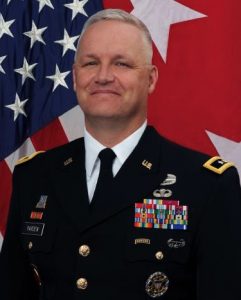
Major General Paul Pardew
Major General Paul Pardew
Commander, Army Contracting Command
Major General Paul H. Pardew is the Commanding General, U.S. Army Contracting Command, Redstone Arsenal, AL. He became ACC’s fourth Commanding General on May 31, 2018.
MG Pardew was commissioned as a second lieutenant, Field Artillery, after graduating from the Virginia Military Institute in 1989.
Prior to assuming command, MG Pardew was ACC’s Deputy Commanding General for OCONUS (Outside the Continental United States) Operations. His previous assignments include Commanding General of the U.S. Army Expeditionary Contracting Command, Redstone Arsenal, AL; Director, Forward Operational Contract Support Integration Cell, U.S. Central Command, Qatar; Deputy Chief of Contracting Management, U.S. Army Corps of Engineers, Washington, DC; Chief, Operational Contract Support and Logistic Services, J4, Joint Staff, Washington, DC; Commander, 414th Contracting Support Brigade, U.S. Army Expeditionary Contracting Command, Vicenza, Italy; Chief of Staff, U.S. Army Expeditionary Contracting Command, Fort Belvoir, VA; Commander, 900th Contingency Contracting Battalion, Fort Bragg, NC and Operation Iraqi Freedom, Iraq; Deputy Chief of Contracting, later Chief of Contracting, Flight Concepts Division, Fort Eustis, VA and Operations Iraqi/Enduring Freedom, Iraq and Afghanistan; Contingency Contracting Officer, 43rd Area Support Group, Fort Carson, CO and Operation Joint Forge, Bosnia-Herzegovina; Executive Officer to the Deputy Chief of Staff for Intelligence, U.S. Army Training and Doctrine Command, Fort Monroe, VA; Intelligence Officer, 1st Squadron, 1st Cavalry, 1st Armored Division, U.S. Army Europe, Germany and Operation Joint Endeavor, Bosnia-Herzegovina; Commander, B Company, 501st Military Intelligence Battalion, 1st Brigade, 1st Armored Division, U.S. Army Europe, Germany and Operation Joint Endeavor, Bosnia-Herzegovina; Assistant Operations Officer, 501st Military Intelligence Battalion, 1st Armored Division, U.S. Army Europe, Germany; Platoon Leader, B Battery, 15th Field Artillery, 7th Infantry Division (Light), Fort Ord, CA; and Fire Support Officer, later Fire Direction Officer, C Battery, 2nd Battalion, 8th Field Artillery, 9th Infantry Regiment, 7th Infantry Division (Light), Fort Ord, CA and Operation Just Cause, Panama.
MG Pardew has a master’s in Business Administration from Old Dominion University and a master’s degree from the National Defense University. His professional military education includes the Field Artillery Officer Basic Course, the Military Intelligence Officer Advanced Course, U.S. Army Command and General Staff College and the Industrial College of the Armed Forces.
His awards and decorations include the Defense Superior Service Medal; Legion of Merit with oak leaf cluster; Bronze Star Medal; Defense Meritorious Service Medal; Meritorious Service Medal with two oak leaf clusters; Joint Service Commendation Medal with oak leaf cluster; Army Commendation Medal with oak leaf cluster; Army Achievement Medal with two oak leaf clusters; Combat Action Badge; Parachutist Badge; Air Assault Badge and Ranger Tab.
ACC, a subordinate command of Army Materiel Command, is comprised of a subordinate one-star command, six major contracting centers and eight contracting support brigades. ACC enables Army readiness through global, expeditionary contracting support to warfighters engaged in military operations, weapon systems acquisition, life cycle management, sustainment and acquisition of goods and services vital to the Soldier’s mission and well-being. Its workforce includes more than 6,000 military and civilian personnel at more than 100 locations worldwide. ACC awarded and managed more than 167,000 contract actions valued at more than $62 billion in fiscal year 2017.
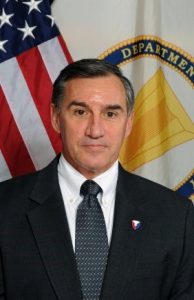
William Marriott
William P. Marriott
Deputy to the Commanding General, Army Aviation and Missile Command
Mr. Marriott was born into Naval Aviation in Pensacola, Florida, during his father’s service as a Navy helicopter instructor pilot. Upon graduation from the Naval Academy in 1979, he enjoyed a 26-year career as a Naval Aviator.
After graduation from the Academy, he attended flight training in Pensacola, Florida, and Corpus Christi, Texas, and was designated a Naval Aviator in November 1980. After training in the P-3 Orion, he joined the Patrol Squadron SIXTEEN (VP-16) “War Eagles” where he became an Instructor Pilot and deployed to Bermuda, the Philippines, Spain, and Iceland. His other operational tours include: Aide and Flag Lieutenant to the Commander, Fleet Air Mediterranean/CTF-67 in Naples, Italy; with the Patrol Squadron FIVE “Mad Foxes” as the Maintenance Officer and Senior Instructor Pilot deploying in support of Operation DESERT STORM and also deploying to Rota, Spain, and Keflavik, Iceland; Commanding Officer of Patrol Squadron SIXTEEN, where he led them on a multi-site deployment to Puerto Rico, Panama, and Iceland; and Commander of Patrol and Reconnaissance Wing TEN at Whidbey Island, Washington. In April 2001, he led Wing TEN through an international crisis when 24 members of one of his aircrews were detained in China after a mid-air collision with a Chinese fighter aircraft.
Mr. Marriott’s staff tours include: Safety and Flight Standardization Officer for Patrol Wing ELEVEN; Special Assistant to the Chief of Naval Personnel for Selection Board Matters; Senior Aide-de-Camp to the Chairman of the Joint Chiefs of Staff, General John Shalikashvili; Federal Executive Fellow at the American Enterprise Institute (AEI) for Public Policy assigned as Staff Director for a bipartisan commission headed by Mr. Dick Cheney and Mr. Richard Perle; Armed Forces Staff College in Norfolk, Virginia; another tour in the Pentagon as a Congressional Analyst for the Secretary of the Navy in the Office of Program Appraisal; Chief of Naval Operations Fellow in CNO’s Strategic Studies Group at Newport, Rhode Island; another tour in the Pentagon as the Executive Officer to the Assistant Secretary of the Navy (Financial Management and Comptroller); and the Executive Secretary for the Department of Defense in direct support of Secretaries of Defense Rumsfeld and Gates.
Mr. Marriott retired from active duty in 2005. He was appointed to the Senior Executive Service in July 2005 and served as the Executive Secretary for DoD until departing for the Army Materiel Command in 2009. He served as the Deputy Chief of Staff for Personnel and G-1 until reporting to AMCOM as the Deputy to the Commanding General in 2015.
His awards include the Presidential Rank Award – Meritorious; Army Decoration for Exceptional Civilian Service; Defense Meritorious Civilian Service Award; Defense Distinguished Service Medal; Legion of Merit (with one star); Defense Meritorious Service Medal; Navy Meritorious Service Medal (with two Stars); Navy Commendation Medal (with four Stars); and numerous campaign, operational and honorary ribbons.
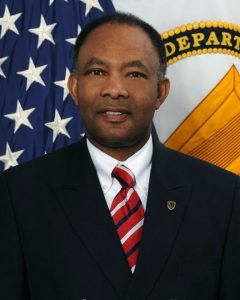
Robert L. Moore
Robert L. Moore, SES
Deputy to the Commanding General, United States Army Security Assistance Command
Mr. Robert L. Moore is Deputy to the Commanding General of the U.S. Army Security Assistance Command (USASAC).
USASAC leads the AMC Security Assistance Enterprise; develops and manages security assistance programs and Foreign Military Sales (FMS) cases to build partner capacity, supports COCOM engagement strategies, and strengthens U.S. Global partnerships. USASAC is the Premier Security Assistance Organization in the Department of Defense. USASAC advances U.S. Strategic Partnerships by providing exceptional support in security assistance and FMS.
The mission of USASAC is to implement approved U.S. Army security assistance programs, including FMS of defense articles and services to eligible foreign governments. The command manages FMS cases with 151 countries with a total value exceeding $180 billion, as well as co-production of Army material.
Today the Command is increasingly responding to support of U.S. Government emergency assistance, humanitarian relief, and Operations Other Than War, including United Nations peacekeeping operations. USASAC’s motto is “USASAC – The Army’s Face to the World.”
Previously, Mr. Moore served as the Executive Director of USASAC. He also served as the Deputy Director of Security Cooperation and ODC Operations, J-5, Headquarters U.S. European Command, Stuttgart-Vaihingen, Germany. Prior to that, he was Deputy Director of Logistics and Security Assistance, J-4 Headquarters U.S. European Command.
Mr. Moore was selected to the Army’s Senior Executive Service in July 2003. Prior to entering the executive service, he served more than 28 years in the United States Air Force, retiring in the rank of Colonel. His military career includes experience in political military affairs, security assistance, and the full spectrum of logistics management. He has served as a missile maintenance officer, branch chief of an inspector general team, squadron commander/deputy commander for maintenance in a Tactical flying unit, director of logistics for a Tactical Air Control Wing, and deputy commander and commander of a logistics group. His last military assignment was with the Embassy of the United States of America as Chief, Office of Defense Cooperation, Berlin, Germany.
He received his Bachelor’s Degree (cum laude) in Biology and Chemistry (1974) and was a Distinguished Graduate, AFROTC, Alabama State University, Montgomery, Alabama; Master’s Degree in Counseling, Pepperdine University, California (1979); Master’s Degree in Logistics Management, Air Force Institute of Technology, Wright-Patterson Air Force Base, Ohio (1981); Squadron Officer School, Maxwell Air Force Base, Alabama (1979); Air Command and Staff College, Maxwell Air Force Base, Alabama (1989); Air War College, Maxwell Air Force Base, Alabama (1992), Senior Executive Leadership Program at the Center for Creative Leadership, Colorado Springs, Colorado (2005); Executive Program on Black Sea Security, Harvard University, Cambridge, Massachusetts (2006); Program for Executives in Logistics and Technology, University of North Carolina (UNC) at Chapel Hill (2007); Leadership and Innovation: Operators Driving Solutions, Business Transformation Agency, UNC at Chapel Hill (2009),; Joint Executive Management Course, Kenan-Flagler Business School, UNC at Chapel Hill (2010), Army Acquisition Corps Leadership Program, Arlington, Virginia (2011); Army Senior Executive Education Program: Intermediate Course, Mendoza College of Business, University of Notre Dame (2012); and Army Senior Executive Education Program: Advanced Course, Darden School of Business, University of Virginia (2016).
Mr. Moore’s Civilian awards consist of the Chairman of the Joint Chief of Staff Distinguished Civilian Award, Meritorious Civilian Service Award, Joint Meritorious Civilian Service Award, Meritorious Presidential Rank Award (2016), AUSA Redstone-Huntsville Department of the Army Management/Executive Civilian of the Year Chapter (2017); AUSA Region Three, Civilian of the Year (2017) Honors: Distinguished Graduate AFROTC. His Military Decorations consist of Legion of Merit, Defense Meritorious Service Medal, Meritorious Service Medal (3 OLC), Air Force Commendation Medal (4 OLC), Joint Service Achievement Medal, National Defense Service Medal (1 OLC), and German Silver Cross-of Honor.

Robert Lightfoot
Robert M. Lightfoot, Jr.
President, LSINC Corporation
Robert Lightfoot is President of LSINC Corporation. He is responsible for leading innovative strategy assurance and product development to help clients achieve mission success.
His extensive knowledge in managing a federal agency through times of significant change allows him to develop strategies and eliminate barriers that can impact necessary change for any organization.
Lightfoot is the former Acting Administrator of the National Aeronautics & Space Administration (NASA). His permanent position at NASA Headquarters was Associate Administrator, the agency’s highest-ranking civil service position. He previously was director of NASA’s Marshall Space Flight Center in Huntsville, AL, one of NASA’s largest field installations, which plays a critical role in NASA’s space operations, exploration and science missions. He spent much of his Marshall career in rocket engine testing and space shuttle propulsion office. He also served as director of the Propulsion Test Directorate at NASA’s Stennis Space Center in Mississippi. After Stennis, two years were spent at NASA Headquarters focused on strategies for the shuttle return to flight following the Columbia tragedy, then initial transition and retirement efforts for shuttle infrastructure.
Lightfoot received a bachelor’s degree in mechanical engineering from the University of Alabama where he is a Distinguished Departmental Fellow for the Department of Mechanical Engineering, a College of Engineering fellow, and served on the Mechanical Engineering Advisory Board. He was inducted into the State of Alabama Engineering Hall of Fame in 2010. He received numerous awards during his NASA career, including the Presidential Rank Award for Distinguished Executives, the highest honors attainable for federal government work, in 2006, 2010 and 2016.
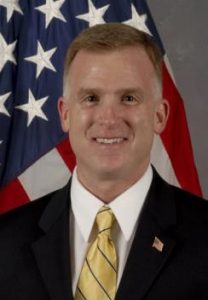
Darryl Colvin
Darryl J. Colvin
Deputy Program Executive Officer, PEO Missiles and Space
Mr. Darryl Colvin is the Deputy for Acquisition and Systems Management (DASM), Program Executive Office (PEO) Missiles and Space, Redstone Arsenal, Al. In this capacity he is the senior advisor, and assists the Program Executive Officer and the Deputy by providing expert technical and professional counsel and recommendations in acquisition matters. Mr. Colvin joined the PEO Missiles and Space team in September 2015.
Prior to this position, Mr. Colvin was the Ground-based Midcourse Defense Interceptor Project Manager. He was responsible for developing, fielding, integrating, and sustaining Ground Based Interceptors to defend the United States against intermediate and long-range ballistic missile attacks. From December 2008 through July 2013, Mr. Colvin served as Project Manager for the Lower Tier Project Office and was responsible for leading the PATRIOT, PATRIOT Advanced Capability-3, Missile Segment Enhancement, Joint Tactical Ground Station, and the US Medium Extended Air Defense System programs.
Mr. Colvin served as the Operations and Integration Officer for the Army Tactical Operations Center Product Office, where he provided strategic planning and direction for Unit Set Fielding and command post standardization across the United States Army. Mr. Colvin was the Army Centrally Selected Product Manager for Field Artillery Launchers, to include the Multiple Launch Rocket System M270/M20A1 launchers and the High Mobility Artillery Rocket System, both Major Defense Acquisition Programs. Mr. Colvin retired as an Army Lieutenant Colonel in January 2006 after faithfully and proudly serving 20 years active duty to the nation.
Mr. Colvin has more than 24 years of professional experience in all aspects of Program Management, Contracting, Financial Management, and Foreign Military Sales for Army ACAT IC/ID programs as well as teaching experience at the United States Military Academy (USMA) at West Point. While at USMA, Mr. Colvin served as an Assistant Professor of Mechanical Engineering where he taught Mechanical and Weapon Systems Design for 3 years and “graduated” with Class of 1997. Mr. Colvin served as the Close Combat Armaments Research and Development Coordinator at Benet Laboratories, as the APM MLRS carrier assigned to the Bradley Fighting Vehicle Systems Project Management Office, as the Department of the Army Systems Coordinator for the Army Tactical Missile System Block II BAT/P3I BAT (to include ATACMS Block I/IA, Unitary and the Earth Penetrator ACTD), and as the Executive Officer to the Deputy for Systems Management within the office of the Assistant Secretary of the Army for Acquisition, Logistics and Technology.
Mr. Colvin is a member of the Army Acquisition Corps and is Level III Certified in Program Management, International Program Management, and Systems Planning, Research, Development and Engineering – Science and Technology career fields. Mr. Colvin earned a Master of Science Degree in Metallurgical Engineering from the Colorado School of Mines and a Bachelor of Science Degree in Mining Engineering from the University of Missouri at Rolla. Mr. Colvin completed numerous leadership courses, including the Army Command and General Staff College, and the DAU Senior Service College Fellowship Program.
Mr. Colvin holds the following civilian and military awards and decorations: the Exceptional Civilian Service Award, the Superior Civilian Service Award, the Commander’s Award for Civilian Service, the Legion of Merit, the Meritorious Service Medal with Oak Leaf Cluster, the Army Commendation Medal with Oak Leaf Cluster and the Army Achievement Medal with Oak Leaf Cluster.
Darryl is married to the former Griselda Covarrubias and they have one daughter, Iliana, and one son, Jonathan, both born from the heart.
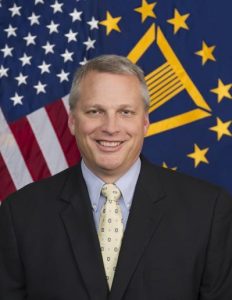
David McNeill
David W. McNeill
Chief Engineer, Engineering Directorate, Missile Defense Agency
Mr. David McNeill is the Chief Engineer for the Missile Defense Agency. As Chief Engineer, Mr. McNeill is responsible to the Director for Engineering for providing sound and integrated engineering and manufacturing processes and products; thorough element engineering controls and management and verification through audit; independent test, analysis, and assessment of failed and high risk events and engineering efforts; industrial and manufacturing readiness; integrated, reliable and sustainable ballistic missile defense elements; and competent next generation of project engineer leaders. Serving as the Chief Engineer, Mr. McNeill’s objective is to bring the Ballistic Missile Defense System into being by providing authoritative and technically sound direction over a broad spectrum of technical and programmatic issues.
Prior to his Senior Executive Service appointment, Mr. McNeill served as the Chief Engineer for Targets and Countermeasures, serving as the single technical authority for 32 target launches. He was also responsible for verifying System Requirements were executable, specification documents were accurate, and systems met final requirements. Mr. McNeill also implemented and maintained responsibility of a rigorous Risk Program in support of MDA’s overall risk process.
Previous assignment with the Missile Defense Agency include Chief Engineer for United States Israeli Cooperative Program Office where Mr. McNeill served as the technical authority for the Arrow 2, Arrow 3, David Sling, and Iron Dome weapon systems. He was responsible for establishing opportunities to further expand the layered Ballistic Missile Defense by exploiting existing technologies to improve Israeli Cooperative programs and improving Phased Adaptive Approach early warning of existing or upgraded Israeli Cooperative systems.
Mr. McNeill served for 25 years with the Aviation and Missile Command in the positions of Senior Design Engineer for the Research and Development Engineering Center; Senior Engineer for Terminal High Altitude Area Defense Project Office Live Fire Test and Evaluation; and Division Chief, Flight Test Planning and Analysis. Mr. McNeill also served 3 years with the Space and Missile Defense Command as the Parametric Edno/Exo Lethality Simulation Program Manager.
Mr. McNeill has over 37 years of engineering experience. He earned a bachelor’s of science degree in Mechanical Engineering from The University of Alabama in Huntsville and obtained Level III Acquisition Professional Certification in Systems, Planning, Research Development, and Engineering.
Mr. McNeill possesses extensive leadership and hands-on technical expertise gained through increasingly demanding engineer positions involving major weapon systems. He is level III certified in System Engineering and a member of the Acquisition Professional Community. Mr. McNeill was awarded the Missile Defense Agency Technical Star Award for exceptional achievements.

David Burns
David Burns
Manager, Science and Technology Office at NASA MSFC
David Burns is the manager of the Science and Technology Office at NASA’s Marshall Space Flight Center in Huntsville, Alabama. Named to the position in January 2017, he leads the organization that plans, develops and executes a broad range of science and technology investigations, programs, projects and activities in support of NASA’s science, technology and exploration goals. Additionally, the office leads the pursuit of new opportunities and partnerships with other government agencies and private industry. Burns oversees an annual budget of more than $200 million and management of a diverse, highly technical workforce of approximately 300 civil service and contractor employees.
His NASA career began in April 2016, when he was named deputy of the Space Systems Department of Marshall’s Engineering Directorate — the department responsible for designing, developing, assembling, integrating, testing and delivering flight, ground, prototype and development products for human spaceflight programs, science investigations and exploration initiatives.
Prior to joining NASA, Burns was director of Science and Technology at the U.S. Department of Defense Missile Defense Agency in Huntsville, where he led the teams that developed directed energy systems, conducted university and small business research and modeled the impact of new missile defense capabilities.
From 2006 to 2008, he was chief executive officer of Dielectric Blue Inc., of Huntsville, a company he founded that specializes in the design and manufacturing of anti-tamper sensors for military and commercial applications. From 2003 to 2006, he was a manager at Science Applications International Corp., of Huntsville, and assisted in the development of the Armed Robotic Vehicle-Heavy, a $2.6 billion element of the Army’s Future Combat System.
Burns retired from the U.S. Air Force in 2003 after 20 years of active duty service, including assignments in the Pentagon and in London, England, where he was technical director of the European Office of Aerospace Research and Development.
Burns holds a doctorate in electrical engineering from the Air Force Institute of Technology in Ohio; a master’s degree in electrical engineering from the University of Dayton in Ohio; and a bachelor’s degree in electrical engineering from the U.S. Air Force Academy in Colorado. He is also a graduate of the Harvard Kennedy School of Government Senior Executive Fellows Program.
Burns and his wife, Cheryl, have four children and reside in Huntsville.
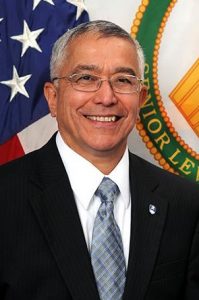
Dr. Steve Pierce
Dr. Steve Pierce
Chief Technology Officer, USASMDC/ARSTRAT
Dr. Steve F. Pierce was promoted to senior level and assigned as the chief technology officer, U.S. Army Space and Missile Defense Command/Army Forces Strategic Command in March 2014.
Dr. Pierce graduated from the United States Military Academy with a Bachelor of Science and was commissioned in the field artillery. His initial assignment was with the 82nd Airborne Division at Fort Bragg, N.C., serving in various staff and command positions. Subsequent tours included battery command in V Corps Artillery in Germany, Fire Support coordinator and battalion command in the 7th Infantry Division, and Operations Research/Systems Analysis team leader at the Directorate of Combat Developments, Fort Sill, Okla., where he headed up the Fire Support Trendline Analysis for the chief of staff of the Army. He was assigned as a professor and course director in the Department of Systems Engineering, West Point, N.Y. Dr. Pierce was then command-selected to be the director of Strategic Policy and Plans and special assistant to the superintendent.
Upon military retirement, Dr. Pierce joined a defense corporation as a military analyst and program manager. Later, he entered government civil service as a senior analyst in the Space and Missile Defense Future Warfare Center before being promoted to division chief. He led key Army and Joint studies to include three operational missile defense studies for combatant commanders and a homeland defense study. In his previous position as director of the Decision Support Directorate, SMDC’s Future Warfare Center, Dr. Pierce led a directorate that included the Studies and Analysis Division, Models and Simulations Division, the Information and Computational Engineering Division, and the Cyberspace Support Branch, 2008-2014.
Dr. Pierce earned a master’s degree in industrial engineering from Georgia Institute of Technology, a Master of Business Administration in finance from Long Island University, and a doctorate in industrial and systems engineering from the University of Alabama in Huntsville. He is also a graduate of the Air Command and Staff College and the Defense Acquisition University Senior Service College. His academic recognition includes Phi Kappa Phi National Academic Honor Society, Alpha Pi Mu Engineering Honor Society and Delta Mu Delta National Business Honor Society. Dr. Pierce was selected as a National Who’s Who Teacher of the Year for his work as a volunteer teacher of algebra and calculus in a private high school.
Dr. Pierce’s military decorations include the Legion of Merit, the Meritorious Service Medal (three awards), the Army Commendation Medal (two awards), and the Army Achievement Medal (two awards). He has also earned the Master Parachutist Badge and Ranger Tab. In 2005, Dr. Pierce was selected by the Association of the United States Army as the Department of the Army Civilian of the Year – Redstone Huntsville Chapter. He is also a member of the Army Acquisition Corps and is Level III certified in program management and systems planning, research, development and engineering.
Dr. Pierce and his wife have seven children and four grandchildren.
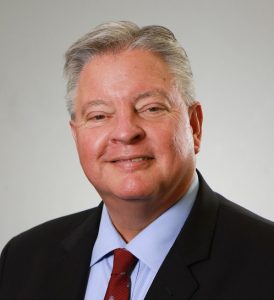
Ronnie Chronister
Ronnie Chronister
Vice President of Contracts, Dynetics
Ronnie Chronister is the vice president of Contracts at Dynetics where he is responsible for providing strategic and day-to-day oversight of Dynetics’ contracting, subcontracting, pricing, purchasing, management of government property, and legal departments. Previously, Chronister was the director of Army and Missile Defense Programs for Dynetics.
Chronister has 32 years’ experience in Army missile, space, and aviation programs, having served in a variety of senior-level Army positions. These include deputy to the commander, U.S. Army Space and Missile Defense Command; deputy to the commanding general, U.S. Army Aviation and Missile Command; executive director, Integrated Materiel Management Center, U.S. Army Aviation and Missile Command; and a variety of positions in the Aviation and Missile Research, Development and Engineering Center.
He served as the senior civilian in each of these organizations that were comprised of workforces up to 11,000 personnel and budgets in excess of $4 billion annually with responsibilities that included the operation, capability, development, and materiel development of all Army space and missile defense systems, as well as the lifecycle management, sustainment, foreign military sales, and all facets of engineering from research to sustainment engineering of all Army aviation and missile systems.
Chronister has been recognized for his leadership and technical abilities with such honors as induction into the Alabama Engineering Hall of Fame and selection as a Distinguished
Engineering Fellow, University of Alabama.
His awards include Presidential Distinguished Rank Award, Decoration for Exceptional Civilian Service (2012, 2014), Secretary of the Army Diversity and Leadership Award, and Secretary of the Army Small Business Award.
Chronister holds a bachelor’s degree in civil engineering from the University of Alabama and a master’s degree in program management from the Naval Postgraduate School where he
graduated with distinction.
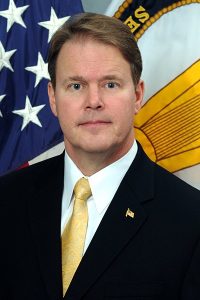
William Nelson
William Nelson
Director, Assured Position, Navigation and Timing (APNT) Cross Functional Team (CFT)
Mr. Nelson is a member of the Senior Executive Service and serves as the Director, Assured Position, Navigation and Timing (APNT) Cross Functional Team (CFT), U.S. Army Headquarters and the Director, Programs and Technology, U.S. Army Space and Missile Defense Command / Army Forces Strategic Command. As the CFT Director, he is responsible for synchronizing PNT efforts across the U.S. Army to narrow capability gaps through experimentation and technical demonstrations to inform, develop and rapidly transition capability requirements to the Army Acquisition system. As the Director for Programs and Technology, he directs research, development and test programs for space, missile defense, directed energy and hypersonic weapon technologies. His previous assignments include Acting Deputy Director of the Technical Center, which overees the Ronald Reagan Ballistic Missile Defense Test Site in the Marshall Islands, and Director for Space and Strategic Systems.
In 2016, he served in a Senior Executive Service Developmental Assignment at U.S. Army Materiel Command, Deputy Chief of Staff G-3/4 for Current Operations planning, directing, synchronizing and integrating the execution of war plans, combat operations, exercise support, aviation management, force protection, law enforcement, cyber operations, training, war reserves-Army prepositioned stocks and readiness of all Army equipment.
Prior to these assignments, he served 13 years in technical and leadership positions at the Missile Defense Agency (MDA). His positions include MDA’s Deputy Chief Engineer, where he led Agency-level technical integration of the Ballistic Missile Defense System, and as the Chief Engineer for the Targets and Countermeasures Program Office, where he led the engineering workforce in the acquisition of air and ground-launched missile systems and re-entry systems.
He served in several other key test and engineering roles for MDA in Huntsville, Alabama, and Washington D.C. As the Director for Mission Management & Integration, he led mission management, test planning and readiness activities for all MDA flight and ground tests. He also served as the Chief of Flight Test Resources managing the coordination, planning and integration of test range assets, ship and airborne mobile sensors, and range safety systems. He also led Site Activation Task Force personnel supporting the presidential-directed Initial Defense Operation emplacing the nation’s first operational Ground Based Midcourse Defense interceptors at Vandenberg Air Force Base, California.
Mr. Nelson earned a U.S. Air Force commission through ROTC at the University of Texas at Austin, and retired as a Space and Missile Officer after 20 years of combined active duty and reserve service. During his military career, he served as Chief of Strategy at USSTRATCOM’s Joint Space Operations Center and Chief of Weapons and Tactics at 14th Air Force Headquarters. He also served as Launch Director for Air Force and National Reconnaissance Office space launch missions, Program Test Manager at the Air Force Operational Test and Evaluation Center and ICBM Missile Combat Crew Commander. His operational deployments include Operations Northern Watch, Noble Eagle, and Enduring Freedom. He earned the Command Space Operations Badge and Master Missile Operations Badge.
Mr. Nelson is a Defense Acquisition Corps member and Level III certified in Engineering and Test & Evaluation. He is married, and they have five children.
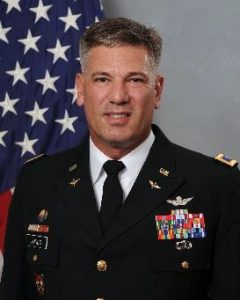
COL John Jones
COL John W. Jones
Commander, Redstone Test Center
Colonel John W. Jones was commissioned as an Army Aviator after graduating from the United States Military Academy in 1990 with a Bachelor of Science Degree in Computer Science. His military education includes Aviation Officer Basic Flight School, Aviation Officer Advanced Course, Army Command and Staff College (Leavenworth), United States Naval Test Pilot School, and Senior Service College (Air War College). He holds a Master of Science in Strategic Studies from Air University and a Master of Arts, Procurement and Acquisition Management from Webster University. He holds Department of Defense Acquisition Corps Level III certifications in Management and Test & Evaluation along with Level II certifications in Contracting and two domains of Systems Planning, Research, Development & Engineering.
Before completing the Air War College in May 2016, Colonel Jones served 23 months as Commander of Defense Contract Management Agency (DCMA) Dallas where he oversaw defense contractors in a four-state geographic area with a $50 billion portfolio of products from 2013-2015. He also served in combat from 2012-2013 for 12 months as Commander of DCMA Afghanistan where he was responsible for $18 billion dollars in DoD contracts and 60,000 contractors supporting theater-wide sustainment and logistics.
He has served in several key acquisition leadership and test management positions to include Commander of DCMA Aircraft Integrated Maintenance Operations (AIMO) in Greenville, Texas, overseeing aviation manufacturing, modification, repair and overhaul (MRO) in three states and seven different facilities from 2011-2012. Colonel Jones served as Commander of DCMA AIMO Enterprise, Alabama, overseeing 10 aviation MRO facilities in four states with 21 fixed and rotary-wing platforms from 2008-2011. He was also Acting Commander for Greenville, South Carolina, overseeing MRO operations in two states. He was the Chief of Flight Test and Director of Test Management, the senior military test pilot, and manager of all flight tests, approving tests, plans, and developing business for the Aviation Technical Test Center at both Fort Rucker and Redstone Army Airfield in Alabama. He managed over 100 fixed and rotary-wing flight test programs from 2002-2008.
His other assignments include operational positions as Air Traffic Service (ATS) Standardization Officer responsible for ensuring all Army ATS assets were certified and flight checked in Germany and deployed areas of the Balkans to include Hungary, Croatia, Bosnia, Montenegro, and Kosovo. He also served as Commander of V Corps COMZ ATS Company, the largest tactical ATS unit in the Army supporting operations in Europe and the Balkans. He served as Operations Officer for V Corps Medium Lift Company (Big Windy), as well as Section and Flight Platoon Leader of XVIIIth Airborne Corps Support Medium Lift Company in Savannah, Georgia.
Colonel Jones’ awards and badges includes the Defense Superior Service Medal, Bronze Star, Defense Meritorious Service Medal, The Army Meritorious Service Medal (with two oak leaf clusters), Army Commendation Medal (with three oak leaf clusters), Army Achievement Medal (with oak leaf cluster) and Overseas Service Medal (four awards). He is a Master Aviator qualified in the CH-47D/F, TH-6, UH-1H, C-12C/D, and UH-60A/L/M. Colonel Jones assumed command of the United States Army Redstone Test Center at Redstone Arsenal, Alabama on 11 August 2016.

Jim Thomson (LinkedIn)
James (Jim) H. Thomson Jr.
Acting Deputy Director, Future Vertical Lift Cross Functional Team
Mr. Jim Thomson is a Highly Qualified Expert (HQE) assigned to the U.S. Army Futures Command Future Vertical Lift Cross Functional Team (FVL-CFT) as a Senior Technical Advisor to the Director. Serving as the Acting Deputy Director he provides critical input in direct support of the Director’s vision of enhancing vertical lift dominance of the future through the development of next generation capabilities. Mr. Thomson is dedicated to creating an organizational climate that values each member of the team while fostering a culture of collaboration, communication, and innovation.
Mr. Thomson is a 30 year veteran of the U.S. Army culminating as a Command Sergeant Major serving at the enterprise level of the Army. After serving as the U.S. Army Aviation Center of Excellence Command Sergeant Major, Mr. Thomson went on to lead the U.S. Army Training and Doctrine Command’s Institute for Noncommissioned Officer Professional Development and the U.S. Army’s Center for Army Leadership before retiring from active duty in June 2018.
Mr. Thomson earned his Bachelor of Arts degree in History from the University of Maryland University College and received his Master of Science degree in Leadership from Trident University International.
Mr. Thomson’s awards include the Defense Distinguished Service Medal, Legion of Merit, Bronze Star Medal, and the Master Aircraft Crewmember badge.
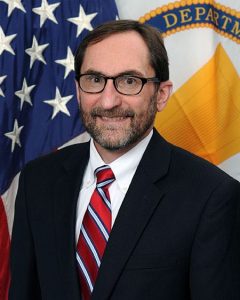
Barry Pike
Barry J. Pike
Director, Weapons Development and Integration Directorate – U.S. Army Aviation and Missile Research, Development, and Engineering Center
Mr. Pike was selected for Senior Executive Service in January 2010. He serves as the Director, Weapons Development and Integration Directorate (WDI), U.S. Army Aviation and Missile Research, Development, and Engineering Center (AMRDEC), Redstone Arsenal, Ala. WDI conducts research, exploratory and advanced development, technology demonstrations, and provides engineering and scientific expertise in all aspects of weapon system design, development, improvement, and integration for the Army. WDI is responsible for integration of these weapon systems onto both manned and unmanned platforms, serves as a life cycle management enterprise for Department of Defense missile technology, and supplies key essential engineering support to our customers for these weapon systems.
CAREER CHRONOLOGY:
- July 2018 – Present – Director, Weapons Development and Integration Directorate, U.S. Army Aviation and Missile Research, Development, and Engineering Center, Redstone Arsenal, Ala.
- January 2016 – July 2018 – Program Executive Officer, Missiles and Space, Redstone Arsenal, Ala.
- February 2010 – January 2016 – Deputy Program Executive Officer, Missiles and Space, Redstone Arsenal, Ala.
- February 2005 – January 2010 – Chief of Staff for Program Executive Office, Missiles and Space, Redstone Arsenal, Ala.
- January 2000 – January 2005 – Chief of Staff/Strategic Planner for Life Cycle Management for Program Executive Office, Air, Space and Missile Defense, Redstone Arsenal, Ala.
- April 1996 – January 2000 – Deputy Program Manager and Chief of the Program and Acquisition Management Division, Army National Missile Defense Ground Based Elements Program Office
- July 1992 – April 1996 – Assistant Program Manager for Program Planning and Supervisory General Engineer, System Engineering Division, Army National Missile Defense Ground Based Elements Program Office
- July 1991 – July 1992 – OSD Staff Specialist and Deputy Director for Ballistic Missile Defense Programs, Office of the Under Secretary of Defense for Acquisition.
- May 1989 – July 1991 – Senior Project Engineer for the Kinetic Energy Anti-Satellite Project Office.
- September 1985 – May 1989 – Project Engineer, U.S. Army Space and Missile Defense Command.
COLLEGE:
- MS, Chemical Engineering, Auburn University, 1985
- BS, Chemical Engineering, Auburn University, 1983
CERTIFICATIONS:
- Level III – Program Management, 1994
- Level III – Systems, Planning, Research, Development & Engineering (SPRDE), 1994
AWARDS AND HONORS:
- Decoration for Exceptional Civilian Service Award, 2016, 2018
- Meritorious Civilian Service Awards, 2005, 2012
- Superior Civilian Service Award, 1997, 2013
- Commander’s Award for Civilian Service, 2001, 2007
- OSD Award for Excellence, 1992
- National Defense Industrial Association Materiel Acquisition Award, 1990
- Ancient Order of Saint Barbara for Air Defense Artillery, 2000
- Nominated for Redstone/Huntsville AUSA Civilian of the Year Award
PROFESSIONAL MEMBERSHIPS AND ASSOCIATIONS:
- Army Acquisition Corps
- Graduate of the Defense Acquisition University Program Management Course

Ray Sellers
Ray K. Sellers
Chief of Staff, PEO Aviation
Mr. Sellers became the Chief of Staff for the Program Executive Office for Aviation in February 2018. Prior to his current assignment, he served as the Assistant PEO for Aviation Engineering and Technology from May 2014 to August 2016. He previously served as Lead Engineer for the Fixed Wing Project Office, and the PEO Aviation Chief of Staff from June 2009 – April 2011. In April 2011, he was selected to attend the Senior Service College Fellowship (SSCF). Following SSCF, he served as PEO Aviation Special Assistant for Aerial Intelligence, Surveillance, and Reconnaissance moving more than twenty systems under PEO Aviation management. He served as the Acting Project Manager (PM) and Deputy PM for Cargo Helicopters from May 2006 through June 2009. Mr. Sellers served as Cargo Chief Engineer from March 2003 to May 2006.
In 1990, Mr. Sellers was assigned to the Air Force Systems Command’s Aeronautical Systems Division at Wright Patterson Air Force Base as a Manufacturing Engineer supporting programs including the F-16 and F-15. In 1991, Mr. Sellers accepted a position in the U.S. Army Aviation and Missile Research,Development, and Engineering Center at Redstone Arsenal, AL. Mr. Sellers served as a Test Engineer,Test Director, Site Manager, and Test Integration Working Group Chair for the Joint Tactical UnmannedAerial Vehicle Project Office until 1996. In March 1996, Mr. Sellers was selected to serve as the TestBranch Chief for the Enhanced Fiber Optic Guided Missile Program. From May 1999 to March 2003, heserved as the Cargo Helicopters Product Assurance, Test and Configuration Management Chief and asthe Deputy Product Manager and Test Chief for the CH-47F Product Office.
Mr. Sellers received a Bachelor of Science Degree in Industrial Engineering from the University of Tennessee in 1988. Mr. Sellers earned a Masters Degree in Industrial and Systems Engineering, with a minor in Mathematical Statistics and Reliability, from the University of Alabama, Huntsville in 1990. Mr. Sellers also received certification in the Air Force Product Assurance Engineering Program. In 2009, Mr. Sellers attended the Harvard Senior Executive Fellows Program and the SEI Senior Leader Education Program. In 2010, he attended the ASAALT/AMC Executive Leadership Forum.
In 2001, Mr. Sellers was selected to the Army’s Competitive Development Group and in 2002 he was appointed to the Army Acquisition Corps being certified at Level III in Program Management, Systems Engineering and Test & Evaluation. Mr. Sellers was selected as the National Army Tester of the Year in 2002. In 1995, and again in 2014, Mr. Sellers received Commander’s Awards for Civilian Service. Mr. Sellers is a member of the Association of the US Army and is currently serving as Vice President for Government Affairs in the Tennessee Valley Chapter of the Army Aviation Association of America. Mr. Sellers is married with two children.

Gregory Carl
Gregory A. Carl
Director, Integrated Security Services
Gregory Carl, Supervisory Special Agent (SSA) served as the Director of the Terrorist Explosive Device Analytical Center (TEDAC), for which he was one of the original architects, from November 2012 through January 2017. TEDAC is the nation’s single strategic level exploitation center and repository for Improvised Explosive Devices pursuant to Presidential Policy Directive (PPD) 17, “Countering Improvised Explosive Devices”. He is acknowledged throughout the world for both his explosives expertise and his leadership in related counterterrorism matters.
SSA Carl joined the Federal Bureau of Investigation (FBI) on 6/15/87. In 1990, he was appointed to the position of Special Agent and was assigned to the Miami Division. In 1996, SSA Carl was reassigned to the FBI Laboratory’s Explosives Unit as an Explosives and Hazardous Devices Examiner. SC Carl has been a Special Agent Bomb Technician for over 15 years.
SSA Carl also served in the Seattle Division as the Supervisor of the Puget Sound Violent Crimes Task Force. Prior to his current position, SSA Carl served as the Unit Chief of the Explosives Unit. SSA Carl was the Coordinating Examiner for the AHMED RESSAM (Millennium Bomber) and RICHARD REID (Shoe Bomber) case and served as the LD forensic manager for the TANBOM (East African Embassy Bombings) crime scene. In addition, SSA Carl served as a Team Leader in the OKBOM (Alfred P. Murrah Federal Building) and TRADEBOM (1993 World Trade Center) bombing crime scene investigations.
SSA Carl has received various awards during his FBI career. In 2002, SSA Carl was awarded the “Director’s Award for Outstanding Contributions in Law Enforcement”. In 2008, he was awarded the Director’s Award for Outstanding Technical Advancement; and, in 2012, he was awarded the FBI’s Director’s Award for Excellence in Investigation Support. He is also a member of the International Association for Chief’s of Police Arson to Explosives Committee and the International Association for Bomb Technician’s and Investigators.
SSA Carl possesses a Bachelor’s degree in Physics from Susquehanna University and a Master’s degree in Forensic Science from George Washington University.
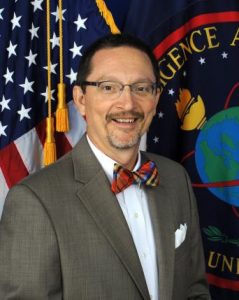
Mark Clark
Mark Clark
Director, Missile and Space Intelligence Center
As the Director of DIA’s Missile and Space Intelligence Center, Mark A. Clark leads engineers and scientists in all-source scientific and technical intelligence analysis of foreign ballistic missile systems, air and missile defense systems, anti-satellite systems, anti-tank guided missile systems, directed energy weapons systems, and associated command and control systems. His mission focus is ensuring timely, accurate assessments of the characteristics, performance, operations, and vulnerabilities of foreign weapons to support Department of Defense development of effective systems, countermeasures, and survivability equipment to support our soldiers, airmen, sailors, and marines.
Leading MSIC, a field operating activity of DIA located on Redstone Arsenal, AL, Clark also oversees all operational and infrastructure activities at the Richard C. Shelby Center for Missile Intelligence, ensuring comprehensive facility management and support for the entire DIA enterprise workforce on Redstone Arsenal. Additionally, Clark is responsible for all external Agency engagements with critical customers, such as the Missile Defense Agency, the U.S. Army Materiel Command, the Federal Bureau of Investigation, the U.S. Army Aviation and Missile Lifecycle Command, and other key partners on Redstone Arsenal.
Upon joining MSIC in 1988, Clark’s first assignment was as an all-source analyst of Soviet anti-ballistic missile systems. Subsequently, he analyzed and assessed foreign anti-satellite missile systems, later serving as a ballistic missile system analyst. During his career at MSIC, he has analyzed or led the analysis of every weapon system in the MSIC mission.
From 2011-2012, Clark represented MSIC and the Defense Intelligence Ballistic Missile Analysis Committee during a joint duty assignment at the Missile Defense Agency.
A native of Fayetteville, TN, Clark earned a Bachelor of Science degree in Electrical Engineering from Tennessee Technological University, Cookeville, TN, and a Master of Science degree in Electrical Engineering from Southern Methodist University, Dallas, TX. He served as a graduate teaching assistant at Auburn University while pursuing post-graduate studies in engineering and mathematics.
Active in his local community for over two decades, Clark has served as Mayor of Fayetteville, TN and as a Fayetteville Alderman. He currently serves as a member of the Fayetteville Board of Education and the Board of Directors for the Tennessee School Boards Association.
Clark and his wife, Laura, reside in Fayetteville, TN. They have four children and three grandchildren.
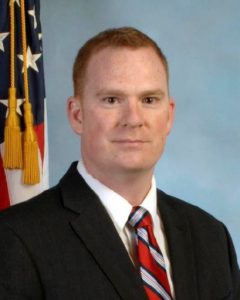
Rob Hamilton
Robert Hamilton
Federal Bureau of Investigation, Senior Executive, FBI Redstone Arsenal
Robert Hamilton is the Federal Bureau of Investigation (FBI) Senior Executive for the FBI at Redstone Arsenal. Mr. Hamilton is responsible for the overall transition of multiple FBI headquarters functions to the Arsenal including the design and construction of new FBI Facilities on Redstone as well as managing all Resource Planning and Human Capital aspects of the transition.
In addition to his role as the FBI’s Senior Executive at Redstone, Mr. Hamilton serves as the Senior Executive responsible for the FBI’s Field Office Facilities portfolio which encompasses in excess of 850 facilities and a yearly budget of approximately $1 billion dollars. He is also responsible for the FBI’s Fleet Management Program, which includes 24,000+ vehicles, and the Environmental, Safety, and Health (ESH) programs for all 56 of the FBI Field Offices. Prior to serving in this role he was the Facilities Services Unit Chief supporting the day to day operations of 3,500+ people working at the FBI complex in Quantico, Virginia. He has also served as the Special Assistant to both the Associate Deputy Director of the FBI and the Assistant Director of the Facilities and Logistics Services Division.
Prior to joining the FBI, Mr. Hamilton was a Program Manager for Raytheon Company serving as the Mission Assurance lead for the Long Range Advanced Scout Surveillance System supporting Army surveillance. Prior to joining Raytheon, Mr. Hamilton served as a Rescue Aviator in the Active Duty US Air Force flying the HC-130 in support of rescue operations worldwide. He is currently serving as a Logistics Readiness Officer in the Air Force Reserves as part of the 459th Air Refueling Wing out of Joint Base Andrews, MD.
Mr. Hamilton earned his undergraduate degree from the U.S. Air Force Academy with a Bachelor of Science in Business Management. He holds a Master of Business Administration from the University of Texas at Austin McCombs Business School and is a recent graduate of the Harvard Business School General Management Program. He is married to Melissa Hamilton and they have four children.
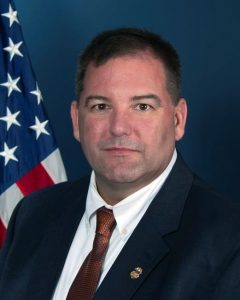
John “JD” Underwood
John “JD” Underwood
Special Agent in Charge, National Center for Explosives Training and Research
John “JD” Underwood is the Special Agent in Charge of the National Center for Explosives Training and Research for the Bureau of Alcohol, Tobacco, Firearms and Explosives (ATF). Underwood, who has been in this position since February 2018, oversees a staff of over 100 special agents, industry operations investigators, explosives enforcement officers, law enforcement training specials, program analysts and contractors who conduct training, research and development, and manage enforcement programs in arson, explosives and canine.
Underwood began his career with ATF in 1997 as a Task Force Officer in Norfolk, Virginia. Underwood was hired as a Special Agent in 2001 and assigned to Roanoke, Virginia. He previously served as an Assistant Special Agent in Charge in the Kansas City Field Division, in headquarters as the Chief of the Force Review Branch, and as the Resident Agent in Charge in Des Moines, Iowa.
In 2008, Underwood received an award in recognition of his efforts during the shooting investigation at Virginia Tech. Prior to joining ATF, Underwood served as a police officer in Portsmouth, Virginia for 10 years.
He holds a bachelor’s degree in Criminal Justice from Old Dominion University.



